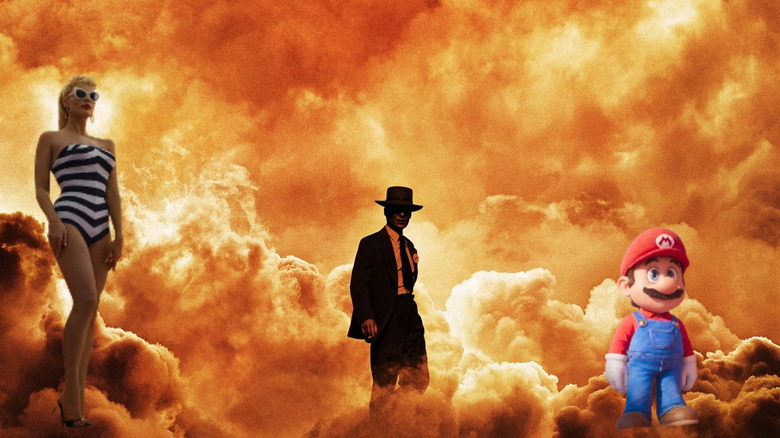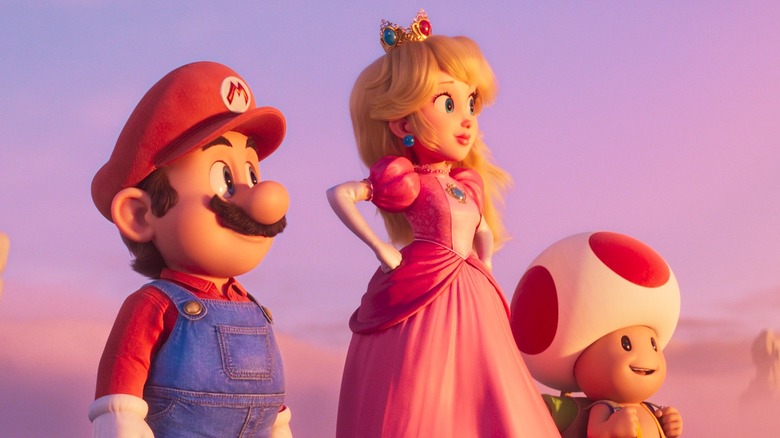The Top 3 Movies Of The Year Are Not Sequels For The First Time In More Than 20 Years
While there is still a chunk of the year left to go, the summer movie season is officially behind us as "The Equalizer 3" topped the charts over Labor Day weekend. With that, we move into fall where awards season hopefuls will enter the fold, and horror movies will look to cash in around the Halloween season. Sure, a movie could break out big between now and December 31 but, by and large, the biggest movies of the year are probably behind us. And, for the first time in more than 20 years, the three biggest of the big movies are not sequels.
Currently, the top three movies of 2023 at the global box office are "Barbie" ($1.384 billion), "The Super Mario Bros. Movie" ($1.359 billion), and "Oppenheimer" ($853.5 million), per The Numbers. Two of these are films based on established IP from Mattel and Nintendo, respectively, while director Christopher Nolan made a biopic about J. Robert Oppenheimer, the father of the Atom bomb. So no, these are not original movies, but they are not sequels to anything and that's the key, as sequels have been dominating Hollywood for decades now.
To that end, the last time the top three movies of the year were not sequels was back in 2001. That year, it was "Harry Potter and the Sorcerer's Stone" ($974.7 million), "The Lord of the Rings: The Fellowship of the Ring" ($880.8 million), and "Monsters Inc." ($528.7 million). In all three cases, the movies ended up becoming franchises anyway, earning billions of dollars for Warner Bros. and Disney, respectively. But within that calendar year, they represented the start of something new — cinematically anyway — that audiences took an interest in. Looking at 2023, it's not all that different.
A fluke or a sign of things to come?
"Barbie" and "Mario" are all but guaranteed to get at least one sequel. The only reason we haven't heard anything official yet almost certainly has to do with the ongoing strikes that have shut Hollywood down. "Oppenheimer" is the bigger outlier here as Nolan's latest will be a one-and-done. Though it did make more than "Guardians of the Galaxy Vol. 3" ($844.3 million), which speaks volumes about the state of moviegoing this year compared to the last 20 years or so. Superheroes, pretty much since "Spider-Man" shattered box office records in 2002, have been the unquestioned dominant force in the industry. That level of success is no longer assured.
Even looking at 2021, the big pandemic recovery year, it was "Spider-Man: No Way Home" pulling in more than $1.9 billion globally that saved the day. "Venom: Let There Be Carnage" ($506.8 million) and "Shang-Chi and the Legend of the Ten Rings" ($432.2 million) did their parts as well. More to the point though, only two of the top 10 movies in 2021 — Chinese blockbusters "The Battle at Lake Changjin" and "Hi, Mom" — weren't sequels. Only one movie in 2022, "The Batman," was not a sequel. Though it was a reboot of a very familiar franchise.
This has largely been the pattern for the past 20 years. In 2011 nine of the top ten movies of the year were sequels led by "Harry Potter and the Deathly Hallows: Part 2" ($1.34 billion). In 2012, it was eight of the top ten, led by Marvel's "The Avengers" ($1.51 billion). And so it was. But that's not necessarily how it will continue to be. Audiences are demonstrating a desire for something different.
Hollywood tends to follow the money, and if money is following new ideas — if those ideas are based on something that already exists — best believe that's what they will invest in.

